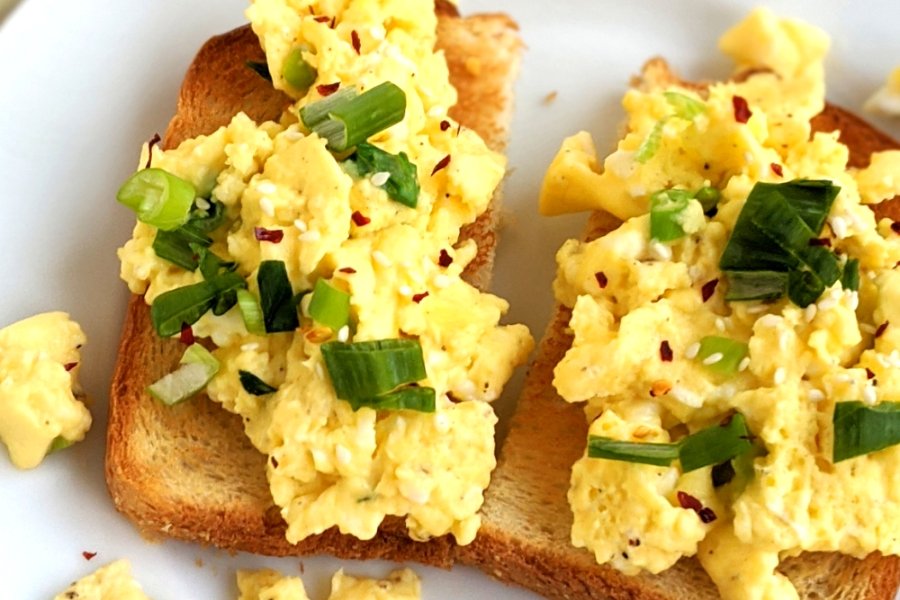Low Sodium Jam Thumbprint Cookies Recipe
These low sodium jam thumbprint cookies are a fantastic recipe for holiday baking, or to enjoy making any time of year! Start by mixing up a 5-ingredient cookie dough, filling the cookies with your favorite jam or preserves, and sprinkling a little powdered sugar on top. See our step-by-step photos below on how to make these simple cookies today.
These easy homemade cookies have no added salt and use a reduced sodium baking powder. They have such a wonderful flavor, no one will be able to tell the salt is missing, these are great cookies to make with family, give as holiday gifts, or just to keep around for a nice snack!
Want more low sodium cookie recipes? Try our low sodium chocolate chip cookies, low sodium kolacky cookies, or our favorite low sodium peanut butter cookies.

I’m trying to flex my baking muscles a bit more, and I wanted to make a super simple low sodium jam cookie recipe to share here. And these cookies are stellar! After making a few batches, I brought some into my office to share with my coworkers, and they got rave reviews. I got messages all day on how excellent they were, so be sure to save or print this recipe – it’s a winner.
Start by mixing up a super basic cookie dough with unsalted butter, sugar, eggs, vanilla, reduced sodium baking powder, and all purpose flour. Then roll the dough into balls, make little divots with your thumb or a spoon, and add in the jam and bake. It takes about 45 minutes start-to-finish, and makes about 48 cookies to share or store for later (see our tips on freezing these below).
Notes from Our Kitchen
- The cookies are crisp and buttery, while the jam centers are sweet and fruity.
- These cookies are versatile, you can add your favorite flavor of jam or preserves, or use a few different jams for a nice variety!
- They are easy to make in a mixing bowl or in a stand mixer, if you have one.
- A great low sodium holiday baking recipe.
- Bakers of any skill level can successfully make these cookies by following our step-by-step photos and directions below.
Ingredients You’ll Need
Be sure to visit the recipe card below to see the full ingredient amounts and directions!
The cookie dough is made with basic all-purpose flour, unsalted butter, white sugar, vanilla extract, and eggs. I also use a reduced sodium baking powder, so see our ingredient spotlight below since the old no-sodium version was recently discontinued.
You can use any jam for these cookies, but try using a really good jam if you can! I’ve made a few batches of these both with raspberry jam and apricot preserves and both turned out fantastic. I get a jam that has no added corn syrup, and only natural ingredients.
And I like dusting the tops of these with a little sprinkle of powdered sugar. It adds a nice little finish, and also I love it if I’m making these for family and friends for the holidays.
Ingredient Spotlight!
Rumford Reduced Sodium Baking Powder
Regular baking powder & baking soda can be high in sodium, making it difficult to make homemade baked goods while on a low sodium diet.
This Rumford brand has 35mg sodium per 1/8th teaspoon serving, making it the lowest baking powder option I’ve seen. It’s the one I use in this recipe, and many others on this site. You can find it in grocery stores, and on Amazon here.

Additions and Substitutions
Jams and preserves! You can use homemade jam or preserves, or a store-bought variety (which is what I used). The possibilities are endless, use strawberry, blueberry, cherry, peach preserves, or any kind of your favorite jam. Or try filling these with lemon curd and topping with a little lemon zest… yum!
Try making these with half brown sugar and half white sugar for a deeper flavor.
You could try mixing up the extract in the cookie dough. Instead of vanilla extract you could try using almond extract, lemon extract, or pistachio extract for different flavored cookies.
The powdered sugar is optional on top of the cookies. They taste great without it too, so feel free to omit if desired.
Step-By-Step Photos & Directions

Step 1: In a large mixing bowl or a stand mixer, cream together the unsalted butter and white sugar together until well combined and has no lumps. Add in the eggs and vanilla extract, and cream again to incorporate all the ingredients together.

Step 2: In a separate mixing bowl, add the reduced sodium baking powder and all purpose flour and mix well to combine.

Step 3: Add the flour to the butter and sugar mixture in 3-4 batches, incorporating the dry ingredients well into the set ingredients in batches until you get a thick cookie dough.

Step 4: Preheat the oven to 350 degrees Fahrenheit. Line 2 baking sheets with parchment paper. Take about 1 tablespoon of dough, and roll it into a ball with your hands. Place the balls of dough onto the baking sheet, with 1-2 inches between each ball.

Step 5: With a small spoon (or your thumbs) make indentations in the center of each cookie dough ball.

Step 6: Into each indentation, add a small scoop of jam or preserves (I used about ½ teaspoon of jam for each cookie). Repeat until all cookies are filled.

Step 7: Bake the cookies for 12-16 minutes, or until the cookies begin to turn light golden brown on the edges.

Step 8: Remove the cookies from the oven, and cool completely. Once cooled, sprinkle a little powdered sugar over each cookie. Store in an airtight container for up to 5 days.
Recipe FAQs
How much sodium are in jam thumbprint cookies?
These low sodium jam cookies have 14mg sodium per cookie, as they are made with unsalted butter, reduced sodium baking powder, and no added salt. Traditional jam cookies from a bakery may have salt or different ingredients, so if you enjoy commercially prepared cookies then the sodium content will vary.
What is the best jam for thumbprint cookies?
The best jam is your favorite jam, whichever fruit you prefer! I used a delicious raspberry jam and apricot for mine, but any variety of thick jam (from a store or homemade) would be great. You could try 3-4 different jams per batch of cookies for some variety.
How to store leftover jam cookies?
I found these store well on the counter or in the refrigerator in an airtight freezer bag. Or you can gift them to others in little cookie bags tied with string (I did this for my coworkers and boss, and was a very popular gal at the office that day!)
Expert Tips
- Be sure to soften the butter to room temperature before creaming it in step one. It needs to be soft (but ideally not melted) to incorporate well into the dough.
- Freeze these cookies! After the cookies get their powder sugar, you can store them in freezer bags for a quick snack anytime, we eat them thawed for a few minutes. Since this recipe makes a lot of cookies, it’s a great way to keep some extras around for a later time.
- Make sure to wait until the cookies have fully cooled before adding the powdered sugar. If you add the powdered sugar when the cookies are still warm, it will ‘melt’ and absorb into the dough. Still tasty, but you won’t get that nice pretty finish.

More Low Sodium Baking Recipes
- Low Sodium Cornbread
- Low Sodium Brioche Bread
- The best Low Sodium Christmas Cookies (for decorating)
- Low Sodium Focaccia Bread
- Low Sodium Wheat Bread
Let’s keep in touch – don’t forget to follow over on Instagram, Facebook, & my Youtube channel for more easy low sodium recipes.
If you made this recipe please leave a star rating & comment below. Your feedback helps other people who are making this recipe.

Our FIRST Low Sodium Cookbook is now available!
Check out Low Sodium Dinners: 100+ Low Sodium Recipes That Actually Taste Good, available here:

Low Sodium Jam Thumbprint Cookies
Equipment
- Mixing Bowl, or Stand Mixer
- Baking Sheets
- parchment paper
Ingredients
- 1.5 cups unsalted butter (3 sticks)
- 1 cup sugar
- 2 eggs
- 1 teaspoon vanilla extract
- 1 teaspoon Rumford's Reduced-Sodium Baking Powder
- 3.5 cups all-purpose flour
- 1/2-3/4 cup jam I used raspberry and apricot
- ¼ cup powdered sugar
Instructions
- In a large mixing bowl or a stand mixer, cream together the unsalted butter and white sugar together until well combined and has no lumps. Add in the eggs and vanilla extract, and cream again to incorporate all the ingredients together.
- In a separate mixing bowl, add the reduced sodium baking powder and all purpose flour and mix well to combine.
- Add the flour to the butter and sugar mixture in 3-4 batches, incorporating the dry ingredients well into the set ingredients in batches until you get a thick cookie dough.
- Preheat the oven to 350 degrees Fahrenheit. Line 2 baking sheets with parchment paper. Take about 1 tablespoon of dough, and roll it into a ball with your hands. Place the balls of dough onto the baking sheet, with 1-2 inches between each ball.
- With a small spoon (or your thumbs) make indentations in the center of each cookie dough ball.
- Into each indentation, add a small scoop of jam or preserves (I used about ½ teaspoon of jam for each cookie). Repeat until all cookies are filled.
- Bake the cookies for 12-16 minutes, or until the cookies begin to turn light golden brown on the edges.
- Remove the cookies from the oven, and cool completely. Once cooled, sprinkle a little powdered sugar over each cookie. Store in an airtight container for up to 5 days.
Notes
- Be sure to soften the butter to room temperature before creaming it in step one. It needs to be soft (but ideally not melted) to incorporate well into the dough.
- Freeze these cookies! After the cookies get their powder sugar, you can store them in freezer bags for a quick snack anytime, we eat them thawed for a few minutes. Since this recipe makes a lot of cookies, it’s a great way to keep some extras around for a later time.
- Make sure to wait until the cookies have fully cooled before adding the powdered sugar. If you add the powdered sugar when the cookies are still warm, it will ‘melt’ and absorb into the dough. Still tasty, but you won’t get that nice pretty finish.
Nutrition estimate (for 1 serving)
*Please note, all nutrition content is estimated based on the ingredients we used in our kitchen. It will vary based on your ingredients. Always check your nutrition labels to verify your nutrition content and sodium amounts.
This post may contain affiliate links. Please note I may earn a small commission from qualifying purchases from affiliate programs, at no additional cost to you. Please read our privacy policy for more information.







I’m so excited to share these low sodium cookies with you! If you make them, please leave a rating and review and let me know how it went!
These are delicious and it’s great that different fruits can be used in the middle